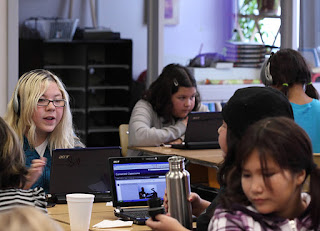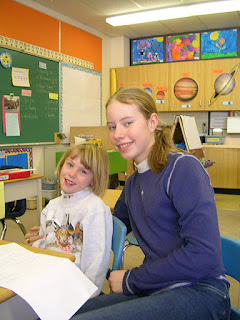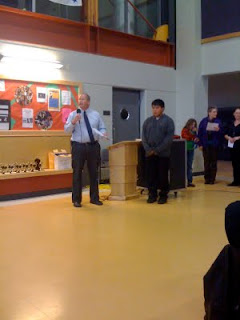Monday, November 7, 2011
Perseverance
Tuesday, November 1, 2011
Lansdowne Middle School - Hooks Readers
Friday, October 28, 2011
BC Innovative Learning Environments
 Connected Classroom - Gold Trail
Connected Classroom - Gold TrailToday the Ministry released the new Education Plan. At the heart of the plan is the focus on learners owning their own learning - and the challenge of designing more responsive, flexible systems to meet the needs of all learners. There are important linkages between the goals of the Education Plan, the focus of the on-going inquiry work in Network schools and the exciting number of truly innovative learning environments that are being developed across BC.
Wednesday, October 5, 2011
Every Learner is a Somebody

At a fund raising event last fall at Alberni Elementary School, a grade one student was overheard saying: "Why do we have to do this? It's not like we're going to make a difference." This sparked discussion among the staff about the ways in which personal beliefs and attitudes dictate personal actions. Out of this, their Network question emerged and they spent a productive year working to equip their learners with the tools, attitudes and beliefs that would encourage genuine community participation. Their observations about the changes in student behaviour and anecdotal feedback from parents told them they were on the right track. The differences in response between their Aboriginal and non Aboriginal learners raised even more questions and they are now seeking out ways to help each child become more aware of their valuable role in the life and care of their classrooms. We think there are lots of schools who would be interested in the specific ways in which the teachers at Alberni are tackling this question.
Wednesday, September 28, 2011
Assessment resources
Monday, June 13, 2011
Awards, recognition and a growth mindset

Does every student in your school have two adults who are crazy about them?
June is the time of year when family members cram into school gyms and auditoriums to celebrate the accomplishments of their young scholars, athletes, and citizens. School awards ceremonies are steeped in tradition and to question the way we recognize our learners can bring out all kinds of emotions.
We know there is an on-going debate about how we recognize excellence and effort - and the extent to which awards ceremonies reinforce what Carol Dweck refers to as a fixed mindset (my abilities are inherent – “I am rotten in French, so was my Dad”) or encourage a growth mindset (I can get better at anything with effort and support – “If I work hard at Math, I know I will improve”). Dave Bartley, Principal with his Star
We watched as “Tom”, hat on backwards, looking down at his feet, heard his teacher say how proud she was of the positive changes he was making in his behavior and how pleased she was to see that he was growing into a fine young man. We watched him stand just a little bit taller and a hint of a smile creep onto his face. We heard another teacher read a poem he had written about “Candace” a young girl with unique learning needs who made his day, every day, by asking how he was – and then listening to hear the answer. Candace glowed as he acknowledged her kindness.
Whether or not this approach to awards will work everywhere is not the point. What does matter is that for this evening, in this school, with the dedication of these teachers, these young people know what it like to have at least one adult who is crazy about them. And maybe, just maybe, they will begin to see themselves as real stars.
Network Reflections and Impact
Over the last few weeks, celebrations of networked learning have been held in twelve sites around the province. Linda and I were able to attend several and in every spot, we were deeply impressed with the quality of the work, the focus on learners owning their own learning, the teamwork across roles, and the dedication and commitment of all of you to achieving our shared vision of EVERY learner crossing the stage with dignity, purpose and options. We have seen countless examples of the positive impact of formative assessment and the confidence learners demonstrate when they can answer the three key questions: Where are you going wih your learning? How is it going? and Where to next? We came away from both the seminar and the celebrations more convinced than ever about the power of networked inquiry to create both quality and equity.
Later this month, along with some Network colleagues, we are meeting with the Minister of Education to share some of our observations about the impact of the Network. We would welcome any observations that you would like to share and invite you to post or email us your comments.
Tuesday, May 31, 2011
Northwest Network Celebration


On May 30 I had the good fortune of attending the Northwest Network celebration in Smithers. The room was packed, the projects are producing impressive results and the commitment and enthusiasm of the participants were pretty amazing. The teamwork across the Northwest in supporting the teachers and principals involved in the depth of inquiry and transformational practice witnessed is making a significant difference.
Here’s some of what we observed:
1. The importance of a focused inquiry versus a goal - many schools reported that by working through their question, they experienced many unanticipated outcomes. They had a chance to go more deeply as the year unfolded, to reframe their thinking, to expand or narrow their focus, and to continually ask themselves - 'is this making a difference to our learners and how do we know?' There was also complete consensus around the notion that inquiry gets a lot harder as teams go deeper,
2. Changing practice is challenging - Prince Rupert Secondary School framed their presentation around professional learning as a game of snakes and ladders. This idea really struck with many of the teams who were able to extend the metaphor as they reflected on learning as much more difficult than teaching. They also used the metaphor to explain the conditions that lead to their finding and climbing the next ladder - as well as the snakes that impeded their progress. This may be a much better image than the implementation dip. The final statement from the PRSS team - 'there is no losing as long as you keep playing' - seemed to me to sum up the spirit and determination of all the educators in the room.
3. Trust, social responsibility, community connections, inclusion and respect were themes that connected across all the presentations. As one presenter paraphrased from Kim Schonert-Reichl's talk at the seminar, "the kids don't care how much we know until they know how much we care." This caring was demonstrated in a range of ways including the two new teachers talking about the TREC program at Pacific Coast School who captured the imagination of everyone in the room.
4. Increasing respect for Aboriginal ways of knowing through building knowledge - whether through traditional ways of learning and knowing, appreciation of a range of art forms, community collaborations, family involvement strategies, cross age coaching, a focus on Aboriginal content in Math and Literacy - were reflected in a number of presentations.
5. The welcoming nature of the northwest to new schools, teachers new to the profession, and experienced educators new to inquiry was also deeply evident. Having a teacher who started her formal career in January 2011 working alongside a teacher who retired last year but is still involved in supporting the staff at her former school with their inquiry provides a powerful model for our profession.
6. We have talked in other settings about the importance of weaving three ways - from the wisdom traditions of our Aboriginal people, the strong research and evidence base from our profession, and from innovative, imaginative approaches at the leading edge of practice - as we work together to create more responsive, relevant, and personalized learning for all BC learners. This weaving was evident in many schools presentations. Kitwanga Elementary School was one of several schools that provided an exceptional model for what this looks like in practice.
Learning with and from other schools on behalf of the students we serve is at the heart of the network. It is a privilege to be part of this work.
Friday, May 6, 2011
Crossing the Stage

We believe in action and are proud that schools across BC are taking up the challenge of EVERY learner crossing the stage with dignity, purpose and options. For a Grade 9 girl failing Math 9 improving dramatically in just one term, for a class of Grade 10 students who have all struggled with literacy and within a semester succeed beyond all expectations, and for the young Aboriginal learners whose mother and father are helping every week in their local school to show their families how much they care about learning, this vision is becoming a reality.
Over dinner with a group of assessment savvy colleagues in Cowichan, we saw video clips of Grade 10 students talking out loud about the difference it made to their learning when they were clear about the learning intentions, when they were able to co-construct criteria and when they received regular coaching feedback. This class was filled with kids who had struggled for years with reading, writing, and had experienced limited success in previous English classes. The next day we had a chance to talk in person with some of these young people, including the young man in the photo. We were moved by their expressed confidence as learners and by enthusiastic plans for their careers after they ‘walk the stage’. What made the difference? The key was a courageous teacher who was determined to apply everything that she was learning about formative assessment and everything she knew from her previous experiences with struggling learners. This class not only demonstrated substantial growth in their skills and confidence, each one of them passed the provincial exam with flying colors.
The third school we visited was a small elementary school serving primarily Aboriginal students. As soon as we walked in the door we were struck by the smell of freshly popped popcorn and the bright displays of student work everywhere in Hul'q'ummi'num' and English. Among the first people we met in the school were a mom and dad, responsible for the smell of popcorn. With five children of their own, they spoke eloquently about the importance of parent involvement. Never have we heard the impact of family support better articulated than by these parents – we wish they had both been wearing a wire! They were showing all the children how much they valued learning. They – along with the staff – were determined that their children would cross the stage and they were doing their part to make that happen. And if popcorn made by a caring mom and dad helps, then bring it on!
Occasionally we can get discouraged about how hard it is to make large-scale system-wide changes. When we visit schools and classrooms such as these, however, our hope is reaffirmed that we can indeed ensure that EVERY learner will cross that stage.
Monday, March 21, 2011
Personalized Learning, Performance Standards and Visual Arts
Getting to Graduation
(BCASCD) is sponsoring a dinner presentation on Getting to Graduation
featuring Gayle Bedard (District Principal, Aboriginal Education,
Surrey), Perry Smith (District Principal, Aboriginal Education, Abbotsford)
and Caroline Mahlman (District Principal, Aboriginal Education,
Sunshine Coast), on April 7 at Heritage Park Secondary in Mission.
Registration begins at 5:30 pm, dinner is at 6 pm and the presentation begins
at 7 pm. Registration is $50 and more information is available at http://
www.bcascd.org or http://twitter.com/BCASCD